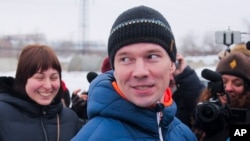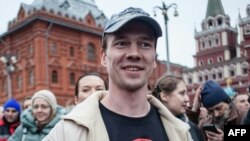Ildar Dadin, a 34-year-old critic of Kremlin policy from the Moscow region, gained fame not only in Russia but also far beyond its borders in December of 2015 when he became the first Russian to be criminally convicted for peaceful protest.
Earlier, in 2014, the State Duma, the lower house of Russia’s parliament, adopted amendments to the country's criminal code introducing criminal penalties for "repeated violation of the procedure for holding rallies." In the opinion of many lawyers and human rights defenders, that decision by the parliamentarians directly violated the Russian constitution, which enshrines the right of citizens to peaceful street protests.
During the period 2011-2015, Dadin was subjected to detention and administrative punishments for participation in protests, and these cases later formed the basis of the criminal case against the activist. He was sentenced to three years imprisonment in December 2015.
In the fall of 2016, Dadin said through his wife that he was tortured and beaten in the prison where he was serving his sentence, located in the northwestern Russian region of Karelia. That provoked a strong reaction in Russia and abroad. His case attracted great public attention and the activist was transferred to a prison colony in eastern Russia.
In early February, the Russian Constitutional Court ordered that the country's Supreme Court should review Dadin's case, but upheld the provision mandating the prosecution of repeated violations of the procedure for holding rallies. Later in the month, the Supreme Court overturned Dadin's conviction and ordered his release from prison.
Dadin was released on February 26, having served a year and two months in prison.
In an interview with VOA’s Russian service, Ildar Dadin discussed torture in Russian prisons, street protests, human rights protection and the need for penalties for human rights violations.
Question: How you have changed, having been jailed for exercising your rights?
Answer: The certainty of my belief in what I was doing has only strengthened. This is as it should be. Plus, there is the knowledge that a very terrible evil is taking place in our prisons and colonies that I previously did not know about. This further gave me confidence that I was doing the right thing, because this shouldn't happen.
Q:How would you describe the work that you are now doing?
A: I am fighting for goodness and justice. In particular, for laws and human rights here to be not only on paper but also implemented in reality. Because the law says that torture is prohibited, but in practice it is widely practiced in jails and prisons. On paper, we have it written that citizens have inalienable constitutional rights, but in fact it turns out that officials who view themselves as rulers and us as slaves trample on all our constitutional rights. They repress people who advocate that the government uphold constitutional rights.
Q: What was the main thing that struck you in prison? What was the most depressing thing?
A: The saddest thing for me is that these sadists who beat and torture people have devised a great many ways, a whole range of humiliations, to crush human dignity, to break a person. And also, the fact that these people are trying pass off these actions as being legal. They pass off as law pure mafia methods of pressuring a person, of breaking them by any means, outright banditry and evil. … These people are evil posing as good, and therefore are super evil. I am sure that this is primarily being done to subordinate people, to turn prisoners into slaves, and to rob those slaves.
Q: How can the use of torture in the Russian prison system be changed?
A: For starters, I think you need to achieve the principle of the inevitability of punishment, inevitability of accountability. For example, I now want to do everything possible so that people from the colony where I served time, who hold official posts and have used their official powers to commit crimes, are jailed, not only because they tortured me (while I was there, I heard them torturing, beating and mocking people), but because… the principle of the inevitability of accountability should be applied to other criminals, to other heads of colonies in other regions of Russia… In my opinion, as long as criminals who hide behind their uniforms and commit crimes are not jailed, it will be a direct example that they can continue to do this. My wife sent a letter from one of those incarcerated in IK-7 (the colony where Dadin served time). In January, the authorities there approached this convict and threatened: "As soon as everything calms down we will cut your legs off.”
Q: How do you assess the prospect of street protests in Russia? How successful can they be?
A: I do not know the exact answer to that question. Logic and experience suggest to me that nothing can happen generally without street protests, because there absolutely has to be pressure from below, from ordinary citizens. As smart and good as the human rights defenders may be, under the constitution, the power is with the people. It is precisely the demands of the people that need to be seen -- their statements that they are confirming the human rights defenders are telling the truth, that they agree with the demands of the human rights defenders. I think this is essential. Human rights defenders must be supported by the citizens on the streets. I now plan to engage in more human rights advocacy – to write complaints to government agencies that should uphold the rule of law, must prosecute criminals. But it seems to me that we should never move away from street activity. Ordinary citizens always have to validate these demands by human rights defenders.
Q: Do you think that the system decided to punish you as example to others?
A: I am 100 percent sure of this. Because they did not need to punish me personally, but above all wanted to show my example to others, so that they do not dare to participate in street protests. When I was still under house arrest, some of the boldest of my fellow human rights defenders came to me and told about how they had to set out for protests with an eye on this article (of the Russian Criminal code introducing criminal responsibility for "repeated violations of the procedure for holding rallies”) and count how many of them had been detained before. And in the course of the proceedings in the so-called Constitutional Court, in an explanatory note to the law that introduced this article of the Criminal Code, it was written that we need a repressive measure, because it is a "stop measure" to stop the protests, because people still continue to come out. The word "repression", "repressive" is definitely there; they they do not even conceal it.
This report was produced in collaboration with VOA's Russian Service.





